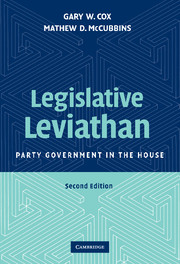Book contents
- Frontmatter
- Contents
- List of Figures
- List of Tables
- Acknowledgments
- Legislative Leviathan
- Introduction
- PART ONE THE AUTONOMY AND DISTINCTIVENESS OF COMMITTEES
- PART TWO A THEORY OF ORGANIZATION
- PART THREE PARTIES AS FLOOR-VOTING COALITIONS
- PART FOUR PARTIES AS PROCEDURAL COALITIONS
- PART FIVE PARTIES AS PROCEDURAL COALITIONS
- 9 The Majority Party and the Legislative Agenda
- 10 Controlling the Legislative Agenda
- Conclusion
- Appendix 1 Uncompensated Seniority Violations, Eightieth through Hundredth Congresses
- Appendix 2 A Model of the Speaker's Scheduling Preferences
- Appendix 3 Unchallengeable and Challengeable Vetoes
- Appendix 4 The Scheduling Power
- Bibliography
- Author Index
- Subject Index
10 - Controlling the Legislative Agenda
Published online by Cambridge University Press: 05 June 2012
- Frontmatter
- Contents
- List of Figures
- List of Tables
- Acknowledgments
- Legislative Leviathan
- Introduction
- PART ONE THE AUTONOMY AND DISTINCTIVENESS OF COMMITTEES
- PART TWO A THEORY OF ORGANIZATION
- PART THREE PARTIES AS FLOOR-VOTING COALITIONS
- PART FOUR PARTIES AS PROCEDURAL COALITIONS
- PART FIVE PARTIES AS PROCEDURAL COALITIONS
- 9 The Majority Party and the Legislative Agenda
- 10 Controlling the Legislative Agenda
- Conclusion
- Appendix 1 Uncompensated Seniority Violations, Eightieth through Hundredth Congresses
- Appendix 2 A Model of the Speaker's Scheduling Preferences
- Appendix 3 Unchallengeable and Challengeable Vetoes
- Appendix 4 The Scheduling Power
- Bibliography
- Author Index
- Subject Index
Summary
Where is democracy? Where is open debate? Where is the free flow of ideas? Not one amendment will be able to be offered to anything the Republicans do today.
– David Bonior (D-MI)The introduction to this part of the book asked whether committees were agents of the House, of the majority party, or of no one but themselves. It is uncontroversial to say that committees are in principle agents of the House. It is, after all, the House that decides whether there will be any committees at all and, if so, determines their jurisdictions, staff allowances, party ratios, and everything else of consequence. The very word committee originally denoted a person (later, a group) to whom some charge, trust, or function had been committed.
The argument is over who exercises the power that the House undoubtedly possesses. The committee government model essentially argues that no one group or coalition is able to use this power effectively; it is so little exercised that committees might just as well be taken as autonomous. We argue, in contrast, that the most important function of the majority party is precisely to seize the House's power to structure the committee system.
The rest of this chapter deals with three questions that naturally arise regarding our claims. First, how does the majority party use the structuring power of the House to influence the committee system? Second, what are the consequences of this structural power?
- Type
- Chapter
- Information
- Legislative LeviathanParty Government in the House, pp. 235 - 254Publisher: Cambridge University PressPrint publication year: 2007
- 1
- Cited by



